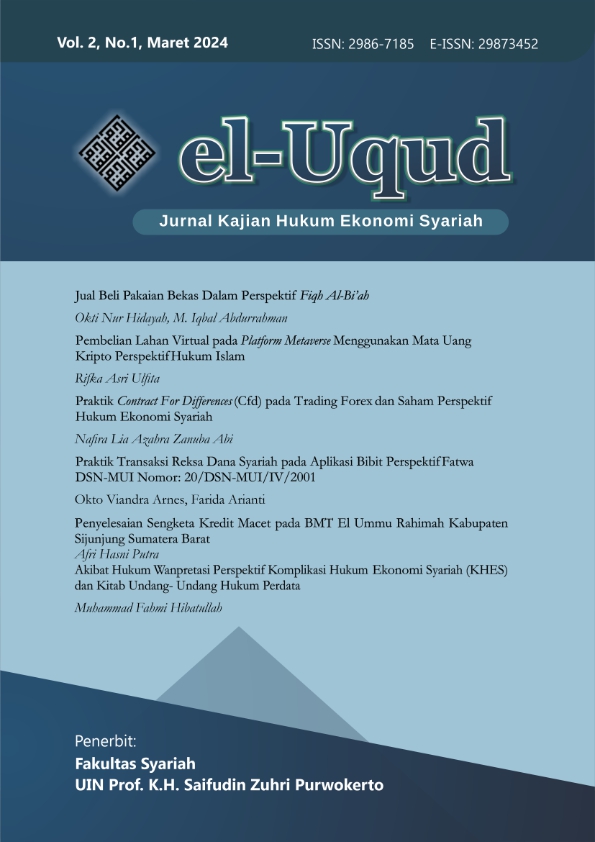Akibat Hukum Wanpretasi Perspektif Komplikasi Hukum Ekonomi Syariah (KHES) dan Kitab Undang- Undang Hukum Perdata
DOI:
https://doi.org/10.24090/eluqud.v2i1.10167Keywords:
Default, Islamic law, Indonesian Civil LawAbstract
Sources of law in Indonesia can be found in the Burgelijk Wetbook (BW) in book III and in the Complications of Sharia Economic Law (KHES) in Indonesia. There is a practice where people in Indonesia have two alternatives in resolving problems in legal incidents (defaults). Communities with religions other than Islam use laws taken from the Civil Code as a basis, while some Muslim communities use the Civil Code or use KHES as a reference in proceedings. Of the many legal activities, there are legal events that are caused by legal subjects which cause one of the legal subjects to experience errors or violations in a legal event. In this article, we will discuss the consequences of default practices, especially in the case of economic engagements. The method used is the normative method with comparative analysis. The result of the discussion is that an agreement is an event where two legal subjects, namely the debtor and the creditor, promise each other to do something or a contract that must fulfill each other's rights and obligations. If one of the legal subjects does not carry out the obligations they mutually agreed upon, then one of them has broken a promise. Broken Promise here is a situation where the debtor does not carry out or fulfill the achievements or obligations of an agreement. The conclusion that the researchers found was the difference in the mention of the term agreement in the Complications of Sharia Economic Law (KHES) and the Indonesian Civil Code (KUHPer). The condition for the validity of an agreement is that legal subjects must be legally competent, the Civil Code states that legal subjects must be 21 years old while KHES legal subjects are 18 years old. The sanctions given by KHES are compensation experienced by creditors, while the KUHPer sanctions given are costs, losses and interest.References
Amin, M., & Dkk. Hukum Perikatan. Jakarta: Prodi Ilmu Hukum FSHN UIN Jakarta, 2012.
Dsalimunthe, D. Akibat Hukum Wanprestasi Dalam Perspektif Kitab Undang-Undang Hukum Perdata (Bw). Jurnal Al-Maqsid, (3) 1. 2017
Fasya, G., & Pajran, H.. Melihat Wanprestasi Dalam Kuhper Dan Khes. Al-Hanan: Jurnal Ilmiah Hukum Ekonomi Syaraiah, 2022.
Nola Pohan, M., & Handayani, S.. Aspek Hukum Terhadap Wanprestasi Dalam Perjanjian Sewa Menyewa Menurut Kitab Undang-Undang Hukum Perdata. Jurnal Perspektif Hukum, 2020.
Satrio. Hukum Perikatan. Bandung: Alumni, 1993.
Sony T, T., & R. G. T, W.. Hukum Bisnis. Jakarta: Prenemedia Group, 2019.
Suadi, A.. Penyelesaian Sengketa Ekonomi Syariah: Penemuan Dan Kaidah Hukum. Jakarta: Prenadamedia, 2018.
Suma, M., & Dkk.. Hukum Perikatan. Jakarta: Prenadamedia, 2019.
Sutarno. Aspek-Aspek Hukum Perkreditan Pada Bank. Bandung: Alfabeta, 2009.
Downloads
Published
How to Cite
Issue
Section
License
Copyright (c) 2024 el-Uqud: Jurnal Kajian Hukum Ekonomi Syariah

This work is licensed under a Creative Commons Attribution-NonCommercial-ShareAlike 4.0 International License.







